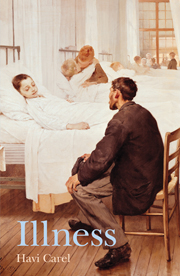Book contents
2 - The social world of illness
Summary
Empathy. If I had to pick the human emotion in greatest shortage, it would be empathy. And this is nowhere more evident than in illness. The pain, disability and fear are exacerbated by the apathy and disgust with which you are sometimes confronted when you are ill. There are many terrible things about illness; the lack of empathy hurts the most.
I am in the respiratory department for my breathing tests. I begin preparing several days before the test. I always brace myself for a decline, telling myself: you know it will be worse this time. A further deterioration brings with it a further shrinking of my world, fewer things I am able to do easily, or do at all. Every month, as my breathing deteriorates, I wonder what will go next. Will I have to give up my electric bike? Will we have to install a downstairs toilet? Will I be able to continue practising yoga? Seeing your capacities diminish, your world becoming smaller and harder to negotiate, is never easy. Most people experience decline over decades. But seeing your abilities shrink at a terrifying pace at the age of thirty-five is horrific. Nonetheless, I know I must have the breathing tests.
A lovely physiologist, Simone, is usually there, chatting to me, telling me about her boyfriend. But this time she is not there. Another physiologist, sullen and unfriendly, leads me to the test room. She sets up the machine without saying a word, hands me a tube and tells me to blow into it as hard and as fast as I can. I take a big breath. I exhale into the tube. I blow hard. My face goes red, my body tenses, my shoulders quiver with the effort. I want good results. I want the same results as last time. I want to be stable, oh, how I want to be stable. I blow until I feel like fainting. I want to be able to blow the same meagre 1.4 litres of air out of my lungs as I did last time.
- Type
- Chapter
- Information
- Illness , pp. 45 - 72Publisher: Acumen PublishingPrint publication year: 2013



